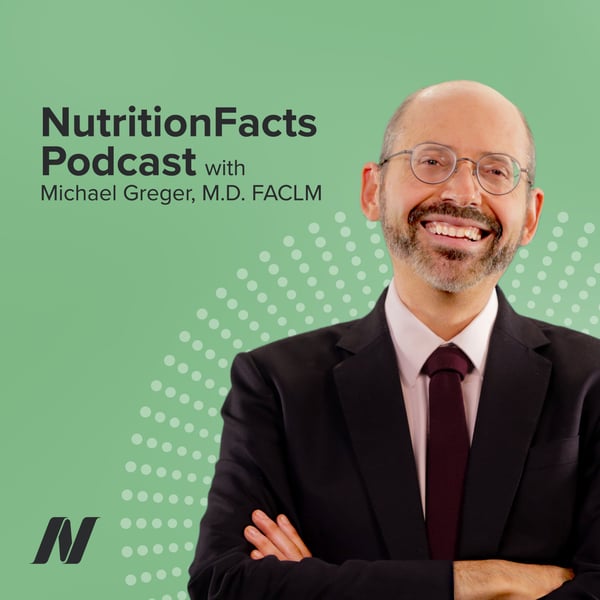Healthy Bones
Nutrition Facts with Dr. Greger
[email protected]
4.8 • 3.6K Ratings
🗓️ 9 February 2023
⏱️ 16 minutes
🧾️ Download transcript
Summary
This episode features audio from Do Vegans Have Lower Bone Mineral Density and Higher Risk of Osteoporosis?, Alkaline Diets, Animal Protein, and Calcium Loss, and Is Milk Good for Our Bones?. Visit the video pages for all sources and doctor's notes related to this podcast.
Transcript
Click on a timestamp to play from that location
| 0:00.0 | We have a lot of choices to make about our diet. Add to that doing the right thing when it comes to preventing or treating a chronic disease, fighting a virus or losing weight, and suddenly our nutrition choices can seem almost overwhelming. |
| 0:16.0 | Well, I'm here to help. Welcome to the Nutrition Facts Podcast. I'm your host, Dr. Michael Greger. |
| 0:23.0 | Today, it all comes down to the sheep and support of our body, the protection of our organs, and those things without which we will become quickly a gelatinous mass. Our bones! |
| 0:35.0 | In our first story, we look at how those eating plant-based diets may be so slim that they may suffer from a loss of bone mass. |
| 0:43.0 | Osteoporosis is estimated to affect 200 million people worldwide. Literally meaning porous bone, osteoporosis, is a disease characterized by reduced bone formation, excessive bone loss, or combination of both, leading to bone fragility and increased risk of fractures, and bone mineral density is the most robust and consistent predictor of osteoporotic fracture. |
| 1:07.0 | What can we eat to boost our bone density? Well, we know that increasing consumption of plant foods is associated with increased bone mineral density. There's an extensive range of micronutrients and phytochemicals packaged within plants that can be powerful promoters of bone health. |
| 1:25.0 | So, healthcare professionals should be encouraged to advise the increased consumption of plant-based foods, particularly in mid-life, irrespective of the client's underlying dietary pattern, meaning no matter how much meat or junk they eat, adding more healthy plant foods may help prevent the development of osteoporosis. |
| 1:42.0 | On the other hand, a more animal source nutrient pattern has been associated with a higher risk of fractures, suggesting that a more animal-based diet is related to bone fragility. So, it would expect less osteoporosis in those eating plant-based diets, but you don't know until you put it to the test. |
| 2:01.0 | The incidence of osteoporosis in vegetarians and omnivores, the first study, published nearly 50 years ago, and the density of the bones that were measured was significantly greater in the vegetarians than the omnivores. In fact, the average bone density, so the vegetarians in their 70s, was greater than the densities of the meat eaters in their 50s. |
| 2:21.0 | Bottom line, these results suggest there's less likelihood of vegetarians developing osteoporosis in old age. Turns out, though, that the researchers screwed up. |
| 2:32.0 | Dexascanting, which is what we use now, didn't come online until the 1980s, so the researchers were just using just regular x-rays, and they confused the readings, such that darker bones on the x-ray got a higher score, but that actually means less bones. |
| 2:47.0 | So, their conclusion should have been the opposite of what they claimed, so vegetarians had worse bone mineral density. |
| 2:53.0 | Fast forward, about 40 years, by which time nine studies have been done on thousands of individuals, and all in all, the results suggest that vegetarian diets, particularly vegan diets, are associated with lower bone mineral density. |
| 3:05.0 | But the magnitude of the association is clinically insignificant, meaning the difference was so small as to not really matter out in the real world, reinforcing the fact that vegetarian diets have no clinically detrimental effect on bone health. |
| 3:19.0 | And it's important to note that the findings of lower bone mineral density didn't fully control for key confounding factors, such as for differences in body weight. |
| 3:28.0 | We know that people who are obese have stronger bones, why? Because they're weight lifting 50 pounds all day every day, maybe 100 pounds. |
| 3:37.0 | If you watch around with 100 pounds backpack every day, your bones would grow stronger too. That's how you build strong bones, weight bearing exercise, so people who weigh more have denser bones. |
| 3:47.0 | And vegetarians, especially vegans, have such low rates of obesity that no wonder, on average, they would have lower bone density. |
| 3:55.0 | The researchers didn't take weight into account, but if the difference they found isn't even clinically significant, who cares? |
| 4:01.0 | As of 2009, the answer to the question is vegetarianism a serious risk factor for osteoporotic fracture? The answer was no. Vegetarianism is not a serious risk factor. |
| 4:12.0 | By 2018, the latest meta-analysis on veganism, vegetarianism, and bone mineral density erupted. |
| 4:19.0 | 20 studies involving tens of thousands of participants and, again, lower bone mineral density was found in studies of vegetarians and vegans compared to meat eaters. |
... |
Please login to see the full transcript.
Disclaimer: The podcast and artwork embedded on this page are from [email protected], and are the property of its owner and not affiliated with or endorsed by Tapesearch.
Generated transcripts are the property of [email protected] and are distributed freely under the Fair Use doctrine. Transcripts generated by Tapesearch are not guaranteed to be accurate.
Copyright © Tapesearch 2025.

